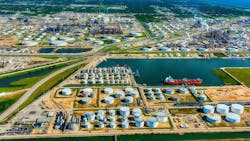Two companies eye Gulf Coast carbon-capture project
Two companies, BP and Linde, plan to develop a carbon capture and storage (CCS) project in Texas that will enable low-carbon hydrogen production at Linde’s existing facilities.
The development also will support the storage of carbon dioxide (CO2) captured from other industrial facilities, paving the way for large-scale decarbonization of the Texas Gulf Coast industrial corridor, according to the two companies.
Upon completion, the project will capture and store CO2 from Linde’s hydrogen production facilities in the Greater Houston area—and potentially from its other Texas facilities—to produce low-carbon hydrogen for the region. The low-carbon hydrogen will be sold to customers along Linde’s hydrogen pipeline network under long-term contracts to enable production of low-carbon chemicals and fuels.
See also: The dawn of hydrogen trucks
As part of the project, BP says it will appraise, develop, and permit the geological storage sites for permanent sequestration of the CO2. BP’s trading and shipping business aims to bring custom low-carbon solutions to the project, including renewable power and certified natural gas, along with commodity trading and price risk management.
Linde said it will use its proprietary technology and operational expertise to capture and compress the CO2 from its hydrogen production facilities for the project. Together with its infrastructure of hydrogen production facilities and its storage cavern connected through its pipeline network across the Texas Gulf Coast, this project will enable Linde to supply cost-effective, reliable low carbon hydrogen and, together with BP, provide carbon capture and storage solutions.
“The energy expertise in Texas and strong supply chains have been generations in the making,” said Dave Lawler, chairman and president of BP America. “This new low-carbon energy project will help us leverage those strengths for the next chapter of the energy transition. In particular, it can help decarbonize hard-to-abate industries for the greatest potential impact on emissions while protecting jobs. BP is proud to support this project as we continue delivering on our own strategy and net zero ambition.”
The project is an important step in the development of BP’s low-carbon business, the company said. BP is evaluating large-scale CCS and hydrogen projects for industrial clusters in the U.S. and already is in action on Teesside, the industrial heart of the United Kingdom.
“Linde is committed to lowering absolute carbon emissions 35% by 2035 and reaching climate neutrality by 2050,” added Dan Yankowski, president of Linde Gases North America. “Capturing the CO2 from our hydrogen production plants in the Houston area will be a significant step toward achieving these goals.
“We are excited to bring Linde’s leading technology portfolio and infrastructure to support this project and make low-carbon hydrogen available to our customers in the Gulf Coast. More broadly, Linde is well-positioned to enable similar projects, be it in the Gulf Coast, where we operate two hydrogen pipelines and a hydrogen storage cavern, or elsewhere in the U.S.”
The overall development, expected to be operational as early as 2026, will also enable capture and storage of CO2 from other large industrial facilities in the region and could ultimately store up to 15 million metric tons per year across multiple onshore geologic storage sites—the equivalent of taking about 3 million cars off the road each year.
This article originally appeared on Bulk Transporter, FleetOwner's sister publication.
